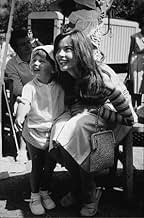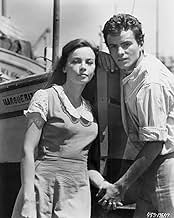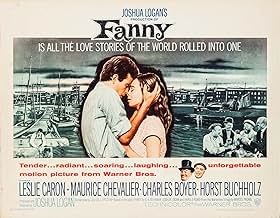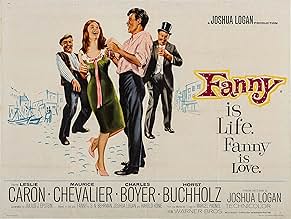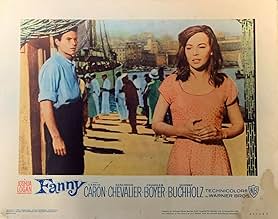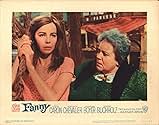Fanny
- 1961
- Tous publics
- 2h 14min
NOTE IMDb
6,8/10
2,9 k
MA NOTE
Ajouter une intrigue dans votre langueYoung Marius dreams of leaving his dull provincial life and seeing the world. When the beautiful Fanny declares her adoration for him, Marius must choose between an adventurous life at sea a... Tout lireYoung Marius dreams of leaving his dull provincial life and seeing the world. When the beautiful Fanny declares her adoration for him, Marius must choose between an adventurous life at sea and the grandest adventure of all: love.Young Marius dreams of leaving his dull provincial life and seeing the world. When the beautiful Fanny declares her adoration for him, Marius must choose between an adventurous life at sea and the grandest adventure of all: love.
- Réalisation
- Scénario
- Casting principal
- Nommé pour 5 Oscars
- 1 victoire et 16 nominations au total
Salvatore Baccaloni
- Escartifigue (Ferryboat Captain)
- (as Baccaloni)
Raymond Bussières
- The Admiral
- (as Raymond Bussieres)
Joël Flateau
- Cesario (Fanny's Son)
- (as Joel Flateau)
Alan Colegrave
- Dead Licker
- (non crédité)
Dominique Davray
- Woman #1 at Fish Market
- (non crédité)
Germaine Delbat
- Louis Panisse's Wife
- (non crédité)
Avis à la une
10stancym
This is one of the sweetest movies ever made, without being "sickeningly sweet." The characters are funny and interesting. All kinds of love are depicted here--parental love, romantic love, love between friends. The characters are very much products of the time and place they live in--Marseille, France, before World War 2. They are steeped in Catholic tradition, which contributes to their inner struggles at times.
The problems of Fanny and Marius might seem dated, and yet the conflict between pleasing parents and following one's heart remains relevant today for many young people. Father-son relationships are as complex today as they were then. Bullying parents may not be as plentiful, or as extreme, as they were in the time FANNY is set, but they still exist.
This is a beautiful film, the right mix of sentimentality and humor. I have only seen it on VHS in pan and scan. There is one place where Marius and Fanny are partially cropped to fit the TV screen, unfortunate but it does not spoil the film.
PUZZLE: I don't know why gorgeous Horst Buchholz didn't get more acclaim for this film from critics at the time or reviewers like me, on this site. He was a young German playing a young Frenchman. But no French or American actor could have played the part better. He expressed angst and love very realistically.
This is a great film for women and for men with a romantic streak, lovers of French stories and locales, and Caron or Boyer admirers. The wrap-up in the last quarter of the film is not perfect, but the film as a whole is a 10, and the lovely score will stay with you!
The problems of Fanny and Marius might seem dated, and yet the conflict between pleasing parents and following one's heart remains relevant today for many young people. Father-son relationships are as complex today as they were then. Bullying parents may not be as plentiful, or as extreme, as they were in the time FANNY is set, but they still exist.
This is a beautiful film, the right mix of sentimentality and humor. I have only seen it on VHS in pan and scan. There is one place where Marius and Fanny are partially cropped to fit the TV screen, unfortunate but it does not spoil the film.
PUZZLE: I don't know why gorgeous Horst Buchholz didn't get more acclaim for this film from critics at the time or reviewers like me, on this site. He was a young German playing a young Frenchman. But no French or American actor could have played the part better. He expressed angst and love very realistically.
This is a great film for women and for men with a romantic streak, lovers of French stories and locales, and Caron or Boyer admirers. The wrap-up in the last quarter of the film is not perfect, but the film as a whole is a 10, and the lovely score will stay with you!
I saw this movie when I was but 11 yrs. old. I am now 56 yrs. old but I have never forgotten its simple beauty, and the powerful emotion portrayed by actors who were expert at their craft. It is a classic, definitely worth seeing.
The story transports you to a world less glamorous, but full of charm and it reflects the passion of young love, the desperation of a girl "in trouble," and it explores the depth of a woman's love for a man, even when he cannot return that love, and for her child. It teaches that a sperm donor does not a father make, but shows how mutual respect can foster great admiration and loyalty, leading to their own special kind of love.
This movie has everything that one can consider good entertainment: the characters are colorful if not intense, the background music is pleasing, the language is acceptable for all ages, there is humor and there are tears. It is one of my all-time favorite movies, in company with the likes of Love is a Many Splendored Thing.
The story transports you to a world less glamorous, but full of charm and it reflects the passion of young love, the desperation of a girl "in trouble," and it explores the depth of a woman's love for a man, even when he cannot return that love, and for her child. It teaches that a sperm donor does not a father make, but shows how mutual respect can foster great admiration and loyalty, leading to their own special kind of love.
This movie has everything that one can consider good entertainment: the characters are colorful if not intense, the background music is pleasing, the language is acceptable for all ages, there is humor and there are tears. It is one of my all-time favorite movies, in company with the likes of Love is a Many Splendored Thing.
This is my favorite Leslie Caron movie. I like it even better than the wonderful "Gigi"--and that's saying a lot.
There are several elements of the movie that are outstanding. The cinematography and music combine to make an incredibly artistic film that helps to convey the love and sadness of the young lovers. The acting is generally top-notch--especially the supporting roles played by Charles Boyer and Maurice Chavalier. But most importantly, the overriding theme is unusual and profound (illegitimacy and the choices you make once this unwanted pregnancy occurs). This makes this film very adult in sensibilities and yet a good family picture as well---I certainly would want my daughters to see and learn from Fanny and Marius' experiences.
This movie has so many wonderful moments (such as Panisse's utter devotion and acceptance of Fanny and her baby, Cesar's confrontation of Marius near the end of the flick or Panisse and Cesar's game with the hat in the street) and overall it can't help but satisfy.
One of the absolute best films of the 1960s--though how it's becomes somewhat forgotten is beyond me.
There are several elements of the movie that are outstanding. The cinematography and music combine to make an incredibly artistic film that helps to convey the love and sadness of the young lovers. The acting is generally top-notch--especially the supporting roles played by Charles Boyer and Maurice Chavalier. But most importantly, the overriding theme is unusual and profound (illegitimacy and the choices you make once this unwanted pregnancy occurs). This makes this film very adult in sensibilities and yet a good family picture as well---I certainly would want my daughters to see and learn from Fanny and Marius' experiences.
This movie has so many wonderful moments (such as Panisse's utter devotion and acceptance of Fanny and her baby, Cesar's confrontation of Marius near the end of the flick or Panisse and Cesar's game with the hat in the street) and overall it can't help but satisfy.
One of the absolute best films of the 1960s--though how it's becomes somewhat forgotten is beyond me.
I won't play the "movie purist" card and pretend that it's not possible to remake Marcel Pagnol's "Marseilles" trilogy, it IS possible. But it's not possible to replace an actor like Raimu, he wasn't just César the gruff and wise barkeeper on Marseilles' waterfront, he was the soul of Marseilles' trilogy, he was the voice, the spirit
and the star. So, it's as hard imagining the trilogy without him than "Casablanca" without Bogart. Yet Raimu died before the final opus "César" was made into a play, and Pagnol's three-part story had such an immediate international resonance that it was begging for remakes and adaptations
and that it inspired a successful Broadway musical is a credit to the universality of the story. So the show had to go on.
But no one can replace Raimu, and in fact, even the other players, Orane Demazis who played the fragile but progressively confident Fanny, Fernand Charpin who played the brave bourgeois Panisse, not to mention Pierre Fresnay as the bitter and tormented Marius were all hard to replace, so one must make the distinction between remaking and retelling. This is what Joshua Logan's "Fanny" does, it reprises the Broadway musical but adapts it into the movie format, compacting the three original movies into one of two hours and ten minutes. The film is colored and colorful, magnificently rendering the sunny soul of Marseilles, and the blueness look even more attractive and hypnotic for Marius whose childhood dream is to escape from the banality of life. He's the freest character of the trilogy, but not the wisest.
Wisdom belongs to César, the barkeeper, and the film tactfully starts with a replay of the famous scene where he shows his son Marius that it takes one third of four different ingredients to make some cocktail. There can't be four thirds, Marius says. It depends on the size of the thirds, retorts César. This scene demonstrates the power of this character, even when he speaks nonsense, he's actually right because he always makes his point. He's the touchstone of a saga of French intonations but that deals with universal life themes such as duty, gender roles and social customs, making almost a hero out of an old man marrying a young woman because he's saving her from disgrace and gives a poor out-of-wedlock child a name. Marseilles' trilogy belongs to the past but that doesn't prevent from rooting for Marius' dreams, Fanny's unfaithful thoughts and Panisse's financial arguments when he woos Fanny, César is actually the most transparent of all, no wonder he's the pillar of the story.
Now, it all comes down to one question: does Joshua Logan's "Fanny" do justice to the original trilogy? It is a matter of opinion and depends on the way you look at the original trilogy. If it's a verbal masterpiece with great insightful quotes about life and death, such as "honor being like a match, you only use it once" or "an empty chair can be sadder than a grave" then yes, "Fanny" of 1961 is a great tribute to Pagnol's eloquence and capability to translate with the right words the emotional complexities of human psyche. Now, if you forever associate the film to the spectacular performance of Raimu, these intimate moments caught in black-and-white, with a few tear-pulling revelations, volcanic tirades and histrionic confrontations, you might find in "Fanny" a pale imitation. But for the film's defense, I don't think anyone ever tried to imitate an actor, one of the film's masterstrokes was to cast French actors, it's twice an excellent idea, they're all aware of the trilogy's reputation and their accent give the film's French touch.
Charles Boyer was believable as a man who'd embody César's psychological traits without being Raimu's César, Leslie Caron added her own dimension of tragic melancholy and even Maurice Chevalier was surprisingly poignant as the unsung hero Panisse. I could even have seen him nominated instead of Boyer. Horst Bucholz was good as Marius, with a sort of Montgomery Clift's fire burning in his dark eyes, and like a good cocktail, Joshua Logan doesn't take the initial trilogy for granted, he changed the balance and gave Fanny and Panisse get the most important roles, maybe only Raimu could have made a passive observer like César such a driving force. But "Fanny" is structured in such a way that the actions sometimes count more than the little introspective moments, even though they spiced up the original trilogy.
So maybe that's the one flaw I'd concede to "Fanny", it puts a lot of good things together but it lacks that little zest that made the first trilogy such a tasty cocktail. And while it provides some powerful emotional moments, the conclusion is treated in a rather rushed away, with a ten-year old boy and a new house in the countryside. I don't know what inspired these artistic licenses, but it sadly took away the film from the atmosphere and the spirit it had set up, there's a sort of change in the air that feels awkward and make hardly believable that so many secrets, revelations, pains and troubles would be relieved in one day, ten minutes in cinematic language, and while I was critical of Césariot's character in the original film, the child doesn't exactly exude realistic vibes and his immediate complicity with Marius was sadly corny.
"Fanny" doesn't shine right away but there are like two hours of the film that work and despite a clumsy beginning and awkward ending, it doesn't ruin the enjoyment for all that, I'd still recommend watching the original first. In fact, I'd recommend the original, period.
But no one can replace Raimu, and in fact, even the other players, Orane Demazis who played the fragile but progressively confident Fanny, Fernand Charpin who played the brave bourgeois Panisse, not to mention Pierre Fresnay as the bitter and tormented Marius were all hard to replace, so one must make the distinction between remaking and retelling. This is what Joshua Logan's "Fanny" does, it reprises the Broadway musical but adapts it into the movie format, compacting the three original movies into one of two hours and ten minutes. The film is colored and colorful, magnificently rendering the sunny soul of Marseilles, and the blueness look even more attractive and hypnotic for Marius whose childhood dream is to escape from the banality of life. He's the freest character of the trilogy, but not the wisest.
Wisdom belongs to César, the barkeeper, and the film tactfully starts with a replay of the famous scene where he shows his son Marius that it takes one third of four different ingredients to make some cocktail. There can't be four thirds, Marius says. It depends on the size of the thirds, retorts César. This scene demonstrates the power of this character, even when he speaks nonsense, he's actually right because he always makes his point. He's the touchstone of a saga of French intonations but that deals with universal life themes such as duty, gender roles and social customs, making almost a hero out of an old man marrying a young woman because he's saving her from disgrace and gives a poor out-of-wedlock child a name. Marseilles' trilogy belongs to the past but that doesn't prevent from rooting for Marius' dreams, Fanny's unfaithful thoughts and Panisse's financial arguments when he woos Fanny, César is actually the most transparent of all, no wonder he's the pillar of the story.
Now, it all comes down to one question: does Joshua Logan's "Fanny" do justice to the original trilogy? It is a matter of opinion and depends on the way you look at the original trilogy. If it's a verbal masterpiece with great insightful quotes about life and death, such as "honor being like a match, you only use it once" or "an empty chair can be sadder than a grave" then yes, "Fanny" of 1961 is a great tribute to Pagnol's eloquence and capability to translate with the right words the emotional complexities of human psyche. Now, if you forever associate the film to the spectacular performance of Raimu, these intimate moments caught in black-and-white, with a few tear-pulling revelations, volcanic tirades and histrionic confrontations, you might find in "Fanny" a pale imitation. But for the film's defense, I don't think anyone ever tried to imitate an actor, one of the film's masterstrokes was to cast French actors, it's twice an excellent idea, they're all aware of the trilogy's reputation and their accent give the film's French touch.
Charles Boyer was believable as a man who'd embody César's psychological traits without being Raimu's César, Leslie Caron added her own dimension of tragic melancholy and even Maurice Chevalier was surprisingly poignant as the unsung hero Panisse. I could even have seen him nominated instead of Boyer. Horst Bucholz was good as Marius, with a sort of Montgomery Clift's fire burning in his dark eyes, and like a good cocktail, Joshua Logan doesn't take the initial trilogy for granted, he changed the balance and gave Fanny and Panisse get the most important roles, maybe only Raimu could have made a passive observer like César such a driving force. But "Fanny" is structured in such a way that the actions sometimes count more than the little introspective moments, even though they spiced up the original trilogy.
So maybe that's the one flaw I'd concede to "Fanny", it puts a lot of good things together but it lacks that little zest that made the first trilogy such a tasty cocktail. And while it provides some powerful emotional moments, the conclusion is treated in a rather rushed away, with a ten-year old boy and a new house in the countryside. I don't know what inspired these artistic licenses, but it sadly took away the film from the atmosphere and the spirit it had set up, there's a sort of change in the air that feels awkward and make hardly believable that so many secrets, revelations, pains and troubles would be relieved in one day, ten minutes in cinematic language, and while I was critical of Césariot's character in the original film, the child doesn't exactly exude realistic vibes and his immediate complicity with Marius was sadly corny.
"Fanny" doesn't shine right away but there are like two hours of the film that work and despite a clumsy beginning and awkward ending, it doesn't ruin the enjoyment for all that, I'd still recommend watching the original first. In fact, I'd recommend the original, period.
I just saw this movie for the first time and loved it very much. The actors are wonderful, especially Charles Boyer (oscar-nominated for his portrayal of Cesar) and Maurice Chevalier; their colorful characters sound so true. Beautifully photographed in Marseille by cinematographer, Jack Cardiff, the scenery is picturesque. Although it was filmed in English, Joshua Logan's film retains the flavor of Marseille and it's people. It is an universal story and has not aged. A mix of comedy and drama, I caught myself laughing and crying at the same time. I highly recommend this movie and hope that Warner Bros. will put it on it's upcoming list of DVD releases.
Le saviez-vous
- AnecdotesJoshua Logan was anxious to replicate the success of Gigi (1958) and according to Leslie Halliwell insisted on a publicity campaign for "Joshua Logan's 'Fanny' ", until the double meaning was explained to him.
- GaffesIn the opening scene at the bar, Marius is seen grabbing a green bottle of wine for his customer from the bar, but when he arrives at the outdoor table to pour the glass, the bottle is now clear.
- ConnexionsFeatured in The 75th Annual Academy Awards (2003)
Meilleurs choix
Connectez-vous pour évaluer et suivre la liste de favoris afin de recevoir des recommandations personnalisées
- How long is Fanny?Alimenté par Alexa
Détails
Box-office
- Montant brut aux États-Unis et au Canada
- 9 996 178 $US
- Durée2 heures 14 minutes
- Rapport de forme
- 1.85 : 1
Contribuer à cette page
Suggérer une modification ou ajouter du contenu manquant




